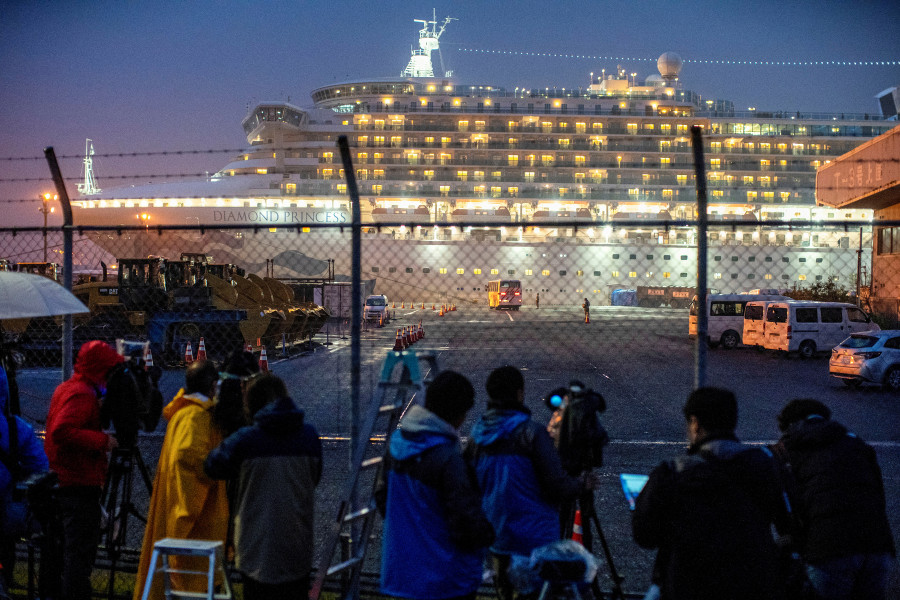Early Thursday morning India airlifted 119 Indian and five foreign nationals, including a Nepali, from Diamond Princess, a quarantined cruise ship, in Japan.
“Other four foreign nationals are from Peru, South Africa and Sri Lanka,” said S Jaishankar, the External Affairs Minister of India, in a tweet.
The identity of the Nepali national has not been disclosed yet. The Nepali Embassy in New Delhi confirmed that one of the rescued is a Nepali national. “We have been informed that one of the persons airlifted to Delhi from Tokyo is a Nepali national,” said Hari Odari, the spokesperson of the Embassy.
According to sources, India airlifted only those who agreed to remain in a quarantine facility for two weeks after being rescued from the ship.
Ten passengers of the Diamond Princess were diagnosed with Covid-19 on February 4. There were 3,711 people on board the ship when it docked at the Yokohama port, near Tokyo, on February 3. The number of Nepalis on the ship could not be ascertained. The ship was placed in quarantine for two weeks.
The Hindu said the evacuees from Diamond Princess will be quarantined in an Army camp at Manesar in Haryana referring to a statement issued by the health ministry this morning. Four passengers have died and around 700 have been infected with Covid-19 in the ship so far.
Frequently asked questions about the coronavirus outbreak
UPDATED as of September 22, 2020
What is Covid-19?
Covid-19, short for coronavirus disease, is an illness caused by the coronavirus SARS-CoV-2, short for severe acute respiratory syndrome coronavirus 2. Common symptoms of the disease include fever, dry cough, fatigue, shortness of breath and breathing difficulties. In severe cases, the infection can cause pneumonia, severe acute respiratory syndrome, kidney failure and even death.
How contagious is Covid-19?
Covid-19 can spread easily from person to person, especially in enclosed spaces. The virus can travel through the air in respiratory droplets produced when a sick person breathes, talks, coughs or sneezes. As the virus can also survive on plastic and steel surfaces for up to 72 hours and on cardboard for up to 24 hours, any contact with such surfaces can also spread the virus. Symptoms take between two to 14 days to appear, during which time the carrier is believed to be contagious.
Where did the virus come from?
The virus was first identified in Wuhan, China in late December. The coronavirus is a large family of viruses that is responsible for everything from the common cold to Middle East Respiratory Syndrome (MERS) and Severe Acute Respiratory Syndrome (SARS). After an initial outbreak in Wuhan that spread across Hubei province, eventually infecting over 80,000 and killing more than 3,000, new infection rates in mainland China have dropped. However, the disease has since spread across the world at an alarming rate.
What is the current status of Covid-19?
The World Health Organisation has called the ongoing outbreak a “pandemic” and urged countries across the world to take precautionary measures. Covid-19 has spread to 213 countries and territories around the world and infected more than 31,405,983 people with 967,505 deaths and 22,990,260 recoveries. In South Asia, India has reported the highest number of infections at 5,557,573 with 88,943 deaths. While Pakistan has reported 306,304 confirmed cases with 6,420 deaths. Nepal has so far reported 65,276 cases with 427 deaths.
How dangerous is the disease?
The mortality rate for Covid-19 is estimated to be 3.6 percent, but new studies have put the rate slightly higher at 5.7 percent. Although Covid-19 is not too dangerous to young healthy people, older individuals and those with immune-compromised systems are at greater risk of death. People with chronic medical conditions like heart disease, diabetes and lung disease, or those who’ve recently undergone serious medical procedures, are also at risk.
How do I keep myself safe?
The WHO advises that the most important thing you can do is wash your hands frequently with soap and water for at least 20 seconds or use hand sanitizers with at least 60 percent alcohol content. Avoid touching your eyes, nose and mouth with unclean hands. Clean and disinfect frequently used surfaces like your computers and phones. Avoid large crowds of people. Seek medical attention if symptoms persist for longer than a few days.
Is it time to panic?
No. The government has imposed a lockdown to limit the spread of the virus. There is no need to begin stockpiling food, cooking gas or hand sanitizers. However, it is always prudent to take sensible precautions like the ones identified above.





 9.83°C Kathmandu
9.83°C Kathmandu














